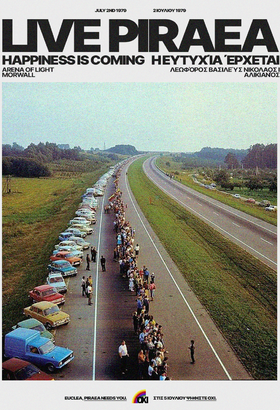Live Piraea
| Live Piraea, Happiness is Coming Live Piraea, Η Ευτυχία Έρχεται | |
|---|---|
 | |
| Host | |
| Venue | Boulevard King Nikolaos I Alikianos, Piraea Arena of Light Morwall, Estmere |
| Presenter(s) | Spiros Pardotis Valentinos Demetriou Kassandra Stamatoglou Conor Murray Eloise Walker Sara Panagea |
| Directed by | Vaso Panakos Eros Kondellis Tobias Taylor-Morris |
| Host broadcaster | Estmerish Broadcasting Service (EBS) Federation of Radios of Opposition in Piraea |
| Participants | |
Live Piraea, originally, Live Piraea, Happiness is Coming (Piraean: Live Piraea, Η Ευτυχία Έρχεται) was a multi-venue awareness and benefit concert held on July 2nd 1979. The event was held simultaneously in the Boulevard King Nikolaos I of Alikianos and the Arena of Light, Morwall. The concert was part of the "No" campaign towards the 1979 Piraean national plebiscite, marking the end of the campaign and March Towards Alikianos, a mass march held from all points of the country towards Alikianos.
In Morwall, the concert was held with the help of the Piraean diaspora (a large portion coming from a leftist background in exile) and idealised to draw international attention towards the plebiscite, the concerns on Human Rights and the state of democracy in the country. In total, between the two cities, over 120,000 people attended the concert and several international stars were allowed to take part in Alikianos, while in Morwall, several artists that had been banned by the dictatorship were able to perform. The concert is widely remembered by generations of young Piraeans living in Euclea, as it marked records in radio listening and television rating figures.
After the concert, the dictatorship preferred to ignore the mass assistance. In Piraea, during the week-long march, several violent incidents were recorded with far-right militants attacking the people that walked towards Alikianos. Following the plebiscite, small groups close to the dictatorship government rumoured that the funds raised could be used in armed far-left militias; however, there was never proof of that. In 1980, it was revealed that a large portion of the money was used in the search of forcely disappeared people, while other was used to bring families together after they were separated in the exile.